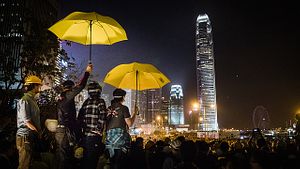The Hong Kong democratic movement is witnessing a watershed moment. Just three years ago, the world watched tens of thousands of Hong Kong residents filled busy thoroughfares for 79 days. The protesters marched together hoping to achieve the promise of universal suffrage laid out in the Basic Law, the territory’s mini-constitution. But after several judicial rulings, including two last week that jailed 16 activists, the Hong Kong government has exhibited its resolve to clamp down on future demonstrations and thus quell the democratic movement.
Hong Kong is more than a glitzy finance hub; the city is, and has been, a politically dynamic place. When the British handed the territory back to China in 1997, they hoped that the political and civil rights guaranteed in the Basic Law would help spur reform on the mainland. China, however, thought it was regaining the aforementioned economic epicenter, and hoped the city would boost its own growth potential. Beijing knew that in order to maintain Hong Kong’s market economy, it would need to uphold Hong Kong’s existing system, but much to Beijing’s chagrin, Hong Kong’s people have remained committed to the democratic path laid out in the Basic Law. This clash of objectives and sentiments toward democracy is now playing out, and Beijing is winning.
While the mainland did reap economic benefits from Hong Kong, it did so at the cost of Hong Kong’s people. An inadequate supply of affordable housing, stiff competition in Hong Kong universities, and imbalanced popular representation in the Legislative Council (LegCo) has fostered a society burdened by inequality. LegCo currently has 70 seats, but only 40 are popularly elected. The remaining 30 members are selected by functional constituencies, which represent various sectors and industries. The majority of functional constituency members are pro-business and in the establishment camp (pro-Beijing). Meanwhile, the chief executive is selected by a 1,200-member committee that has similar representation as the LegCo functional constituency.
Given this lack of political participation, Hong Kong has become a place of protest. The feedback mechanism that exist in a representative democracy — i.e. voting out a legislator for not adhering to constituents wishes — is gone, forcing people to the streets to voice dissatisfaction (often a result from either economic or political inequality). These actions should be protected by the Basic Law, which grants the right to freedom of assembly. In the last year, however, both the Hong Kong government and Beijing have taken actions to limit the democratic movement and its main tool of protesting.
While the 2014 Umbrella Movement did not achieve its main objective in obtaining universal suffrage for the 2017 chief executive elections, it did produce a new cohort of activist politicians. This anti-establishment bloc (which includes both pan-democrat and localist candidates) won a majority of seats within the geographical constituency (the popularly elected part) during the September 2016 LegCo elections. And yet, the euphoria from this victory quickly subsided when the Hong Kong government initiated a series of judicial cases against several lawmakers over improper oaths. By last month, six anti-establishment legislators have lost their seats following two court decisions based on an interpretation by Standing Committee of the National People’s Congress (NPC-SC) in Beijing outlining that all LegCo oaths must be taken “sincerely.”
Lawmakers isn’t the only victim of the recent campaign to discredit the democratic movement. In the past two weeks, government prosecutors have appealed the community service sentences given to two groups of activists for unlawful assembly charges. Thirteen activists who protested a new development project by storming LegCo in June 2014 were ordered by a lower court to do 80 to 150 hours of community service, which they completed. But, this week, an appeals court changed the ruling to 13 months of jail time. Similarly, Joshua Wong, Nathan Law and Alex Chow, three of the student leaders during the Occupy Protests, have received harsher punishments and now must serve six to eight months. Prosecutors reportedly sought tougher sentences in order to deter future protests, despite residents’ right to assemble.
The slow, but steady, erosion of Hong Kong’s civil and political rights and independent judicial system has reached a pivotal juncture. By ousting six legislators, the anti-establishment LegCo bloc no longer holds veto power to prevent LegCo rule changes. Further, the recent judicial rulings altering the sentences means that these activists will not be able to run for by-elections to fill the vacant LegCo seats, because the law prohibits anybody who has served over three months in jail in the past five years from running for office. While Beijing has always wielded a hand in Hong Kong’s political system, we are now seeing an accelerated and more aggressive effort to remove pro-democracy activists from engaging within the Hong Kong political framework, while simultaneously co-opting and depreciating other institutions.
The second system in Hong Kong’s “one country, two system” governing model is critical for global companies to create and maintain a presence in Hong Kong. But, if the Hong Kong government, supported by Beijing, continues to chip away at the guarantee outlined in the Basic Law, it could create instability that will deter further investment. And, as Joshua Wong and Johnson Yeung argued, the continued suppression of youth activists could have a lasting impact on an entire generation. Ultimately, with each swing of a hammer against the democratic movement, the Hong Kong government only worsens the political divide and emboldens the people it seeks to control.
Maeve Whelan-Wuest is an analyst at a think tank in Washington, DC. Her research focuses on Hong Kong, Taiwan and East Asia governance issues.

































